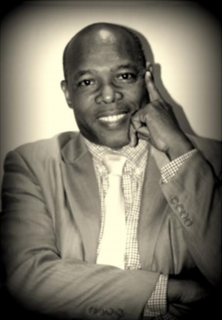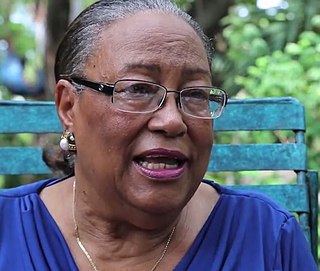The Ecumenical Center for Human Rights (Centre Oecumenique des Droits de L'Homme) is a human rights organisation founded in Santo Domingo, Dominican Republic in 1979 to monitor the situation in Haiti under the dictatorship of Jean-Claude Duvalier. The center became a leading critic of the abject living conditions of Haitian cane cutters in the Dominican Republic, known as "Braceros". When in 1980, the center's Director was barred from Dominican Republic, its activities were transferred to San Juan, Puerto Rico. From 1986 onwards it has been based in Port-au-Prince, Haiti.
The Director, Jean-Claude Bajeux, was forced to flee because of his anti-government activities in 1993, but went back to Haiti following the return of Jean-Bertrand Aristide.
The organization is one of the founding members of the Caribbean Human Rights Network.

Haiti, officially the Republic of Haiti, and formerly known as Hayti, is a country located on the island of Hispaniola in the Greater Antilles archipelago of the Caribbean Sea, to the east of Cuba and Jamaica and south of The Bahamas and the Turks and Caicos Islands. It occupies the western three-eighths of the island which it shares with the Dominican Republic. To its south-west lies the small island of Navassa Island, which is claimed by Haiti but is disputed as a United States territory under federal administration. Haiti is 27,750 square kilometers (10,714 sq mi) in size, the third largest country in the Caribbean by area, and has an estimated population of 11.4 million, making it the most populous country in the Caribbean.

Jean-Bertrand Aristide is a Haitian former Salesian priest and politician who became Haiti's first democratically elected president. A proponent of liberation theology, Aristide was appointed to a parish in Port-au-Prince in 1982 after completing his studies to become a priest. He became a focal point for the pro-democracy movement first under Jean-Claude "Baby Doc" Duvalier and then under the military transition regime which followed. He won the 1990–91 Haitian general election, with 67% of the vote. As a priest, he taught liberation theology and, as a president, he attempted to normalize Afro-Creole culture, including Vodou religion, in Haiti.

François Duvalier, also known as Papa Doc, was a Haitian politician who served as the President of Haiti from 1957 to 1971. He was elected president in the 1957 general election on a populist and black nationalist platform. After thwarting a military coup d'état in 1958, his regime rapidly became more autocratic and despotic. An undercover government death squad, the Tonton Macoute, indiscriminately killed Duvalier's opponents; the Tonton Macoute was thought to be so pervasive that Haitians became highly fearful of expressing any form of dissent, even in private. Duvalier further sought to solidify his rule by incorporating elements of Haitian mythology into a personality cult.

Jean-Claude Duvalier, nicknamed "Baby Doc", was a Haitian politician who was the President of Haiti from 1971 until he was overthrown by a popular uprising in February 1986. He succeeded his father François "Papa Doc" Duvalier as the ruler of Haiti after his death in 1971. After assuming power, he introduced cosmetic changes to his father's regime and delegated much authority to his advisors. Thousands of Haitians were killed or tortured, and hundreds of thousands fled the country during his presidency. He maintained a notoriously lavish lifestyle while poverty among his people remained the most widespread of any country in the Western Hemisphere.
Matthieu Prosper Avril is a Haitian political figure who was President of Haiti from 1988 to 1990. A trusted member of François Duvalier's Presidential Guard and adviser to Jean-Claude Duvalier, Lt. Gen. Avril led the September 1988 Haitian coup d'état against a transition military government installed after Jean-Claude Duvalier's 1986 overthrow. He was President until March 1990, in a period which according to Amnesty International was "marred by serious human rights violations". He was arrested in 2001, but released in March 2004 after the 2004 Haitian coup d'état overthrew Jean-Bertrand Aristide.
Paul Arcelin is a Haitian who lived in Canada for many years in exile from the Duvalier dictatorship because of his political activities. He married a Canadian woman with whom he raised two children in Montréal.
Jean-Claude Bajeux was a Haitian political activist and professor of Caribbean literature. For many years he was director of the Ecumenical Center for Human Rights based in Haiti's capital, Port-au-Prince, and a leader of the National Congress of Democratic Movements, a moderate socialist political party also known as KONAKOM. He was Minister of Culture during Jean-Bertrand Aristide's first term as President of Haiti.

According to its Constitution and written laws, Haiti meets most international human rights standards. In practice, many provisions are not respected. The government's human rights record is poor. Political killings, kidnapping, torture, and unlawful incarceration are common unofficial practices, especially during periods of coups or attempted coups.

The Catholic Church in Haiti is part of the worldwide Catholic Church, under the spiritual leadership of the pope, the Curia in Rome and the Conference of Haitian Bishops.

Michèle Bennett is the former First Lady of Haiti and the ex‑wife of former President of Haiti, Jean‑Claude Duvalier. They fled to France together when he resigned in 1986; they divorced in 1990.

Solange Pierre, known as Sonia Pierre, was a human rights advocate in the Dominican Republic who worked to end antihaitianismo, which is discrimination against individuals of Haitian origin either born in Haiti or in the Dominican Republic. For this work, she won the 2006 Robert F. Kennedy Human Rights Award.
Prostitution in the Dominican Republic is legal, but related activities such as brothel-keeping or pimping are illegal. However, prostitution laws are generally not enforced. It is estimated that between 6,000 and 10,000 women work as prostitutes in the country, with many of the sex workers coming from neighboring Haiti. The population of illegal Haitian migrants in the country is particularly vulnerable to exploitation.

Mario Joseph is a Haitian human rights lawyer. Since 1996, he has led the Bureau des Avocats Internationaux (BAI) in Port-au-Prince, which represents political prisoners, impoverished communities, and victims of political violence. In 2006, The New York Times called Joseph "Haiti's most prominent human rights lawyer".

Ady Jean-Gardy born in Haiti, is a reformist and international press activist. He became Minister of Communication in Haiti (2012–13), after a brilliant experience as Chief of Staff of the Haitian Ministry of Foreign Affairs. He deeply designed reforms for public communication without propaganda, respecting the human rights organizations and positioned Haiti as a powerful member of the African Union at Addis Ababa (Ethiopia). He worked to end civil wars in Africa and promoted a new image of Haiti as an International leader for peace. Ady Jean Gardy is also the founder of the Haitian Press Federation, an umbrella organization for various Haitian press associations. He founded the Haitian University of Journalism and Social Communication or the Haitian Center for Teaching Journalists.
The St. Jean Bosco massacre took place in Haiti on 11 September 1988. At least 13 people were killed and around 80 wounded in a three-hour assault on the Saint-Jean Bosco church in Port-au-Prince, which saw the church burned down.
Sarodj Bertin Durocher is a Haitian lawyer, best known as a beauty pageant contestant.
Williams Régala is a former member of Haiti's National Council of Government. He was a member of the short-lived first council, as well as the second council, which ruled until 7 February 1988, when Leslie Manigat took office
Roger Lafontant was the former leader of the Tonton Macoutes and the former Minister of Haitian dictator Jean-Claude Duvalier. He was the leader of an attempted coup d'état in January 1991, an effort which ultimately led to his death.

The Duvalier dynasty was an autocratic family dictatorship in Haiti that lasted almost twenty-nine years, from 1957 until 1986, spanning the rule of the father-and-son duo François and Jean-Claude Duvalier.

Suzy Castor is a Haitian historian, educator and human rights activist.